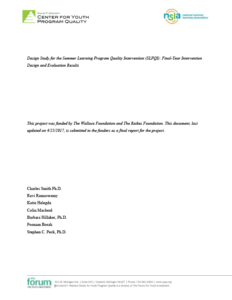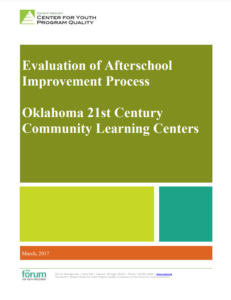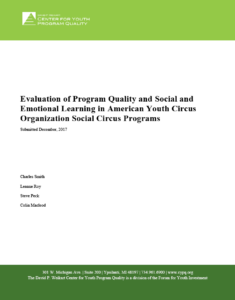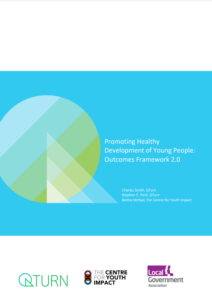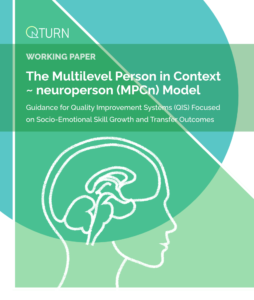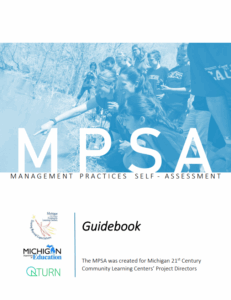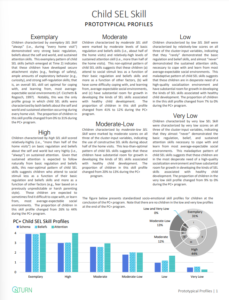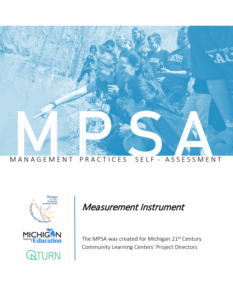Page 3 of 5
Design Study for the Summer Learning Program Quality Intervention (SLPQI)
This paper describes implementation and outcomes for QIS in school-based summer learning programs in multiple cities.
Tags: Evaluation Exemplars from QIS Data
January 1, 2017
Evaluation of Afterschool Improvement Process: Oklahoma 21st Century Community Learning Centers
This paper describes validity of QIS performance measures and longitudinal change over four years in Oklahoma 21st CCLC programs.
Tags: Evaluation Exemplars from QIS Data
March 1, 2017
Evaluation of Program Quality and Social and Emotional Learning in… Social Circus Programs
This report exemplifies use of the suite of SEL measures and benchmarks in the American Youth Circus Organizations network.
Tags: SEL Performance Standards
December 1, 2017
Quality-Outcomes Study for Seattle Public Schools Summer Programs
This quality-outcomes study was designed to both (a) describe performance in Seattle Public Schools (SPS) summer learning programs in ways that are useful to staff and (b) provide evaluative evidence (i.e., validity) for an instructional model that includes challenging academic content and responsive instructional practices.
Tags: Evaluation Exemplars from QIS Data, quality-outcomes design
January 11, 2018
Measure Once, Cut Twice: Using Data For Continuous and Impact Evaluation in Education Programs
This paper describes a generic quality-outcomes design (Q-O design) that meets the need for performance measurement methodology for concurrent and integrated impact evaluation and continuous improvement in the same organization; that is, measure once, cut twice.
Tags: measurement, quality-outcomes design
April 9, 2019
Promoting Healthy Development of Young People: Outcomes Framework 2.0
In the summer of 2018, the Local Government Association (LGA) in England commissioned the Centre for Youth Impact to produce an outcomes framework to help partners across the English youth sector to develop and agree on mutual aims to support young people in their local areas. The work was in response to LGA’s consultations that led to its vision statement described in the report, Bright Futures: Our Vision for Youth Services, published at the end of 2017.
October 23, 2019
The Multilevel Person in Context ~ neuroperson (MPCn) Model
The multilevel person-in-context model of youth development programs facilitates thinking about how the SEL skills being developed at the point of service (POS) are both (a) embedded within the wider context of policy decisions, family background, and out-of-school time (OST) program quality and (b) related subsequently to shorter-term youth outcomes (e.g., SEL skill growth) and longer-term youth achievements (e.g., graduation and employment).
October 26, 2019
Management Practices Self-Assessment (MPSA) Guidebook
The Management Practices Self-Assessment (MPSA) is a measurement instrument created to empower Michigan 21st CCLC Project Directors, who manage at least one program site. The MPSA provides Project Directors with the opportunity to check-in with themselves and their team by identifying practices and policies that are well-documented and working well, or that could be updated or improved, and areas where they need additional assistance to reach their full potential.
January 27, 2020
Child SEL Skills
This two-page information sheet explains youth profiles for SEL skills (low, moderate, and exemplary) as they relate to schemas, beliefs, and attention. Created as a supplement to QTurn’s impact report for the Newark Trust for Education Project (NTE) Parent Child Plus (PC+) program, this overview explains how various measurements are tied to key outcomes.
June 13, 2020
Management Practices Self-Assessment (MPSA)
The Management Practices Self-Assessment (MPSA) is a measurement instrument created to empower Michigan 21st CCLC Project Directors, who manage at least one program site. The MPSA provides Project Directors with the opportunity to check-in with themselves and their team by identifying practices and policies that are well-documented and working well, or that could be updated or improved, and areas where they need additional assistance to reach their full potential.
July 8, 2020
